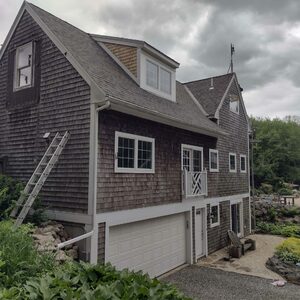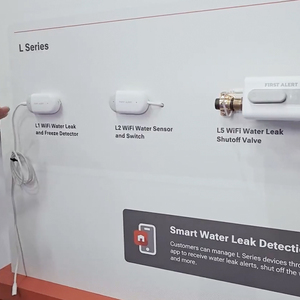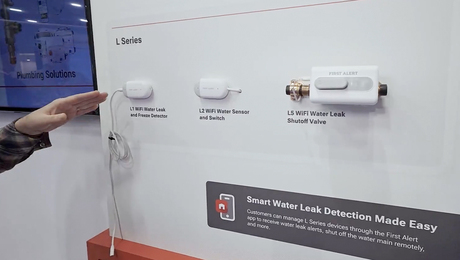News Briefs
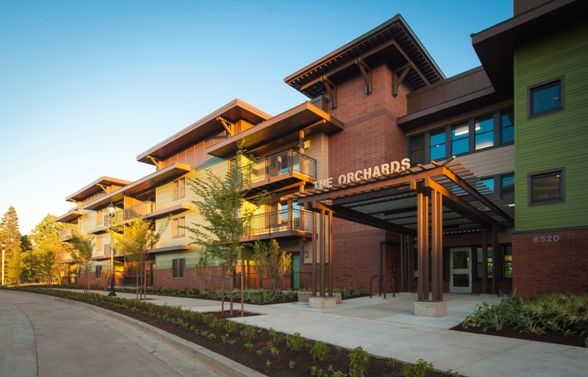
The U.S. Department of Energy is looking for college design teams to develop plans for low-cost, zero-energy homes suitable for mainstream builders.
Registration is now open for DOE’s 2016 Race to Zero Student Design Competition, to take place at the National Renewable Energy Laboratory in Golden, Colo., next April 16 and 17.
The 2015 competition attracted 33 teams from 27 U.S. and Canadian universities. According to the DOE website, teams are given a specific design problem and asked to either redesign an existing floor plan or create a new design that satisfies project requirements.
There are four categories, with up to 10 teams competing in each: suburban single-family detached, urban single-family detached, attached (two- to six-unit duplex or townhouse style), and small multifamily (three or fewer stories above grade). There’s more information at the Department of Energy website.
Smart-Meter Case Settled
A protracted legal squabble over the installation of smart meters in a Chicago suburb may be at an end.
According to an article in the Chicago Tribune, the Naperville City Council has voted to pay Kim Bendis $117,500 to settle her federal lawsuit alleging the city and police officers violated her constitutional rights during an arrest two years. Bendis, an outspoken critics of the city’s plan to install smart meters, was filming a smart meter installation at the time.
As GBA reported earlier, Bendis and a group she founded objected to the installation of smart meters on privacy grounds. A federal district court judge earlier this year, however, blocked the group’s efforts to stop the installations.
A Business Code for Solar Installers
The Solar Energy Industries Association (SEIA) has adopted a new business code to guide transactions between solar companies and their customers.
The SEIA Solar Business Code covers advertising, customer acquisition, sales and marketing, and terms of contracts with consumers. The trade group has published the code at its website.
“We’ve had a Code of Ethics for years, but wanted to push further in consumer protection,” CEO Rhone Resch said in a news release. “SEIA and the solar industry are taking the right path in helping to make sure both solar companies and consumers fully understand each and every transaction.”
The rapid increase in residential solar installations has brought some growing pains to the industry. Early this year, more than a dozen members of the U.S. House of Representatives asked two federal agencies to investigate claims that consumers might be targets of “potentially deceptive sales tactics.”
SEIA later published a residential consumer guide to solar power. The Federal Trade Commission also has published a guide for consumers.
PHIUS wins foundation grant
The Passive House Institute U.S. (PHIUS) has picked up a $200,000 grant that will fund its efforts to develop high-performance affordable housing.
The money, awarded by the John D. and Catherine T. MacArthur Foundation, helped pay for programming related to multifamily Passivhaus housing at the recent North American Passive House Conference in Chicago.
In addition, the grant will underwrite a variety of related PHIUS efforts on multifamily construction, including a design guide for wall assemblies, ventilation and other building components; more technical support for WUFI Passive, the modeling software used for building design; and webinars specific to multifamily design and construction.
The money will be paid out over an 18-month period and furthers the organization’s goal of broadening the reach of its North American building standard.
“Over the past 10 years, PHIUS has made significant progress in developing a solid design
methodology and energy performance standard appropriate for North American climates and
construction practices,” the organization said in a news release. “Until recently, however, passive house remained something of a boutique niche for forward-thinking single-family homeowners. Not any more.”
PHIUS also said it was compiling presentation slides and selected videotapes from the Chicago conference and making them available online. For more, browse its interactive website and follow the links.
Colorado now offers energy scorecard
Colorado has become the second state in the country to offer the Home Energy Score program, a rating system that provides home efficiency scores and recommendations to both buyers and sellers.
The rating system was developed by the U.S. Department of Energy (DOE), and in Colorado will be run by the state’s Energy Office. Connecticut began offering the program in April and a number of other states also have expressed interest, the Energy Department said.
Qualified assessors collect information about a property and generate a score on a scale of 1 to 10. Assessments give buyers the benefit of an energy rating similar to the miles-per-gallon sticker on a vehicle, and guide sellers on how to make their houses more attractive to buyers.
Colorado is offering $750 for every 1-point improvement a borrower makes on the score at the time of purchase or refinance, up to $3000 for a 4-point improvement, DOE said.
Price of solar energy hits all-time low
Utility-scale solar developers have been negotiating power sales agreements with utilities at prices averaging 5 cents per kilowatt hour, an all-time low, the Lawrence Berkeley National Laboratory said in a report.
The lab attributed lower prices to lower installed costs, improved project performance, and a surge in the number of projects in anticipation of a sharp cut in the investment tax credit at the end of 2016.
Utility-Scale Solar 2014 also reports that installed project costs have dropped by more than 50% since 2009, with median up-front costs falling from about $6.30 per watt in 2009 to $3.10 per watt for projects completed last year.
Newer projects also generate electricity more efficiently. Projects finished in 2013 had an average capacity factor of 29.4% in 2014, what the lab called a “notable improvement” over projects built in 2012 and 2012. Power purchase agreements also have fallen to new lows, the report said, and make solar “an increasingly cost-competitive option for utilites.”
Read more: http://www.greenbuildingadvisor.com/blogs/dept/green-building-news%2A#ixzz3nRGfQk6b
Follow us: @gbadvisor on Twitter | GreenBuildingAdvisor on Facebook
Fine Homebuilding Recommended Products
Fine Homebuilding receives a commission for items purchased through links on this site, including Amazon Associates and other affiliate advertising programs.

8067 All-Weather Flashing Tape

Handy Heat Gun

Reliable Crimp Connectors
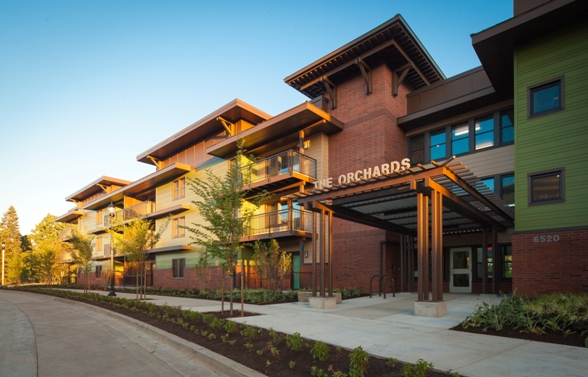
The Passive House Instsitute U.S. has been awarded a grant to help promote the Passivhaus building standard in multifamily projects, like the 57-unit Orchards at Orenco project in Oregon.


